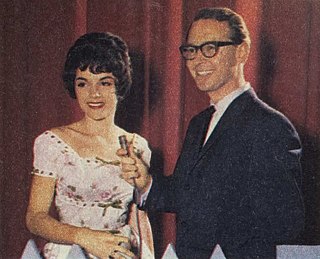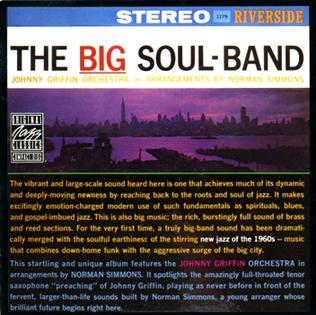
The bass saxophone is one of the lowest-pitched members of the saxophone family—larger and lower than the more common baritone saxophone. It was likely the first type of saxophone built by Adolphe Sax, as first observed by Berlioz in 1842. It is a transposing instrument pitched in B♭, an octave below the tenor saxophone and a perfect fourth below the baritone saxophone. A bass saxophone in C, intended for orchestral use, was included in Adolphe Sax's patent, but few known examples were built. The bass saxophone is not a commonly used instrument, but it is heard on some 1920s jazz recordings, in free jazz, in saxophone choirs and sextets, and occasionally in concert bands and rock music.
The Australian Entertainment Mo Awards were an annual Australian entertainment industry award, that where established in 1975, to recognise achievements in live entertainment in Australia. They were last awarded in 2016.

The Diamonds are a Canadian vocal quartet that rose to prominence in the 1950s and early 1960s with 16 Billboard hit records. The original members were Dave Somerville (lead), Ted Kowalski (tenor), Phil Levitt (baritone), and Bill Reed (bass). They were most noted for interpreting and introducing rhythm and blues vocal group music to the wider pop music audience. Contrary to a popular myth, the father of Tom Hanks was never a member of the group.
Leslie William Morrison, known professionally as Lucky Starr, is an Australian pioneer rock and roll, pop and country music singer, guitarist and television presenter. His most popular single, "I've Been Everywhere", appeared in early 1962, which peaked at number one in Sydney. Starr became well known through his many TV appearances on show's such as Bandstand and Six O'Clock Rock, in which he briefly hosted taking over from Johnny O'Keefe, he was the first star to entertain troops in Vietnam.
Barry John Stanton was an English-Australian rock and roll musician. He performed on pop music programs, Six O'Clock Rock, Bandstand, Johnny O'Keefe Show, Sing Sing Sing, Saturday Date, and Woody's Teen Time. He issued a compilation album, A Tribute to the King Rare Songs 1957-1965, in 1988.

John Michael O'Keefe was an Australian rock and roll singer whose career began in the early 1950s. A pioneer of Rock music in Australia, his hits include "Wild One" (1958), "Shout!" and "She's My Baby". In his twenty-year career, O'Keefe released over fifty singles, 50 EPs and 100 albums. O'Keefe was also a radio and television entertainer and presenter.

Bandstand is an Australian live pop music, variety television program screened from November 1958 to June 1972. Featuring both local and international music artists, and produced in-house at the studios of the Nine Network in Willoughby, New South Wales, it was originally broadcast only in New South Wales, It became a national program in the early 1960s as the network expanded into other Australian states. The host of Bandstand for its entire existence was radio presenter and television newsreader Brian Henderson.

Lee Gordon was an American entrepreneur and rock and roll promoter who worked extensively in Australia in the late 1950s and early 1960s. Gordon's jazz and rock'n'roll tours had a major impact on the Australian music scene and he also played a significant role in the early career of pioneering Australian rock'n'roll singer Johnny O'Keefe, serving as his manager.
Dr. Music was a Toronto jazz group founded in 1969 by producer, arranger and performer Doug Riley. The band recorded three albums and toured across Canada. The personnel of the band changed throughout its history, with Riley remaining at the core of the group.

Christ Church, Lavender Bay is an Anglican church in the Sydney suburb of Lavender Bay, New South Wales, Australia, just north of the Sydney Harbour Bridge. The church is listed on the Register of the National Estate.
Bryan Davies is a British-born Australian pop music singer and entertainer. He appeared on 1960s TV pop shows, Sing! Sing! Sing! and Bandstand. From March 1962, at age 17, he became the youngest person in Australia to host their own TV show, The Bryan Davies Show. The singer issued two albums, On My Way (1965) and Together by Myself (1968). His most popular singles were, "Dream Girl" and "Five Foot Two Eyes of Blue" (October), which both reached the top 4 on the Sydney charts.
Warren Williams, is an Australian rock musician. In the 1950s, he was a pioneer of Australian rock music, forming the group Warren Williams and the Squares. Williams was a prolific songwriter.
Edward Leslie "Ted" Hamilton (OAM), is an Australian former singer, composer, playwright, entrepreneur, and actor.

The Big Soul-Band is an album by the Johnny Griffin Orchestra, led by jazz saxophonist Johnny Griffin, featuring arrangements by Norman Simmons. It was released on the Riverside label in 1960.

Digby George "Dig" Richards was an Australian rock and roll singer, songwriter, instrumentalist, musical theatre actor and television presenter, active during the late 1950s and early 1960s as lead singer with the R'Jays. Richards was the first Australian rock and roll artist to record a 12" LP record in Australia, with the self-titled album Dig Richards, released in November 1959. From 1971 he performed as a solo country music artist. According to the Kent Music Report he had four Top 30 national hit singles, "(My) Little Lover" / "Quarrels ", "A Little Piece of Peace", "People Call Me Country" / "The Dancer", and "Do the Spunky Monkey". On 17 February 1983 Digby Richards died of pancreatic cancer, aged 42. He was survived by his wife, Sue and two children.
Lorraine May Chapman, professionally known as Laurel Lea, was an Australian popular singer of the late 1950s and early 1960s. Lea appeared regularly on TV series, Bandstand, Six O'Clock Rock and Saturday Date. In 1974 and 1975 she toured throughout Australia with contemporaries Johnny O'Keefe, Johnny Devlin, Lonnie Lee and Barry Stanton. On 31 January 1992 Lea died of leukaemia.

The Crescents were a vocal harmony group which formed in Sydney, Australia in late 1958 under the name The 4 Tops. The Crescents were best known for their Top 10 hit "Mr. Blue" and for their tours with Lee Gordon's "Big Shows" supporting Johnnie Ray, Fabian, and Ricky Nelson.

Colin John Loughnan is an Australian jazz saxophonist, teacher, and composer, best known as a member of the Delltones, Ayers Rock, Judy Bailey quartet, and as a teacher of saxophone at the Sydney Conservatorium of Music. Although Loughnan has long been associated with jazz music, the first nine years of his career were spent as a non-instrumental vocalist with vocal harmony groups The Crescents, and The Delltones starting in 1958. In the 60s, he learnt to play the saxophone, performing as an instrumentalist with Col Nolan and The Soul Syndicate, and as a founding member of the Daly-Wilson Big Band. At this time Loughnan was proficient in saxophones, flutes, and clarinet.
Keith Gilchrist, known professionally as Sandy Scott, is an Australian singer and television compere. He was a regular guest on the television music program Bandstand and released many records, including the top 25 hit "Wallpaper Roses".










